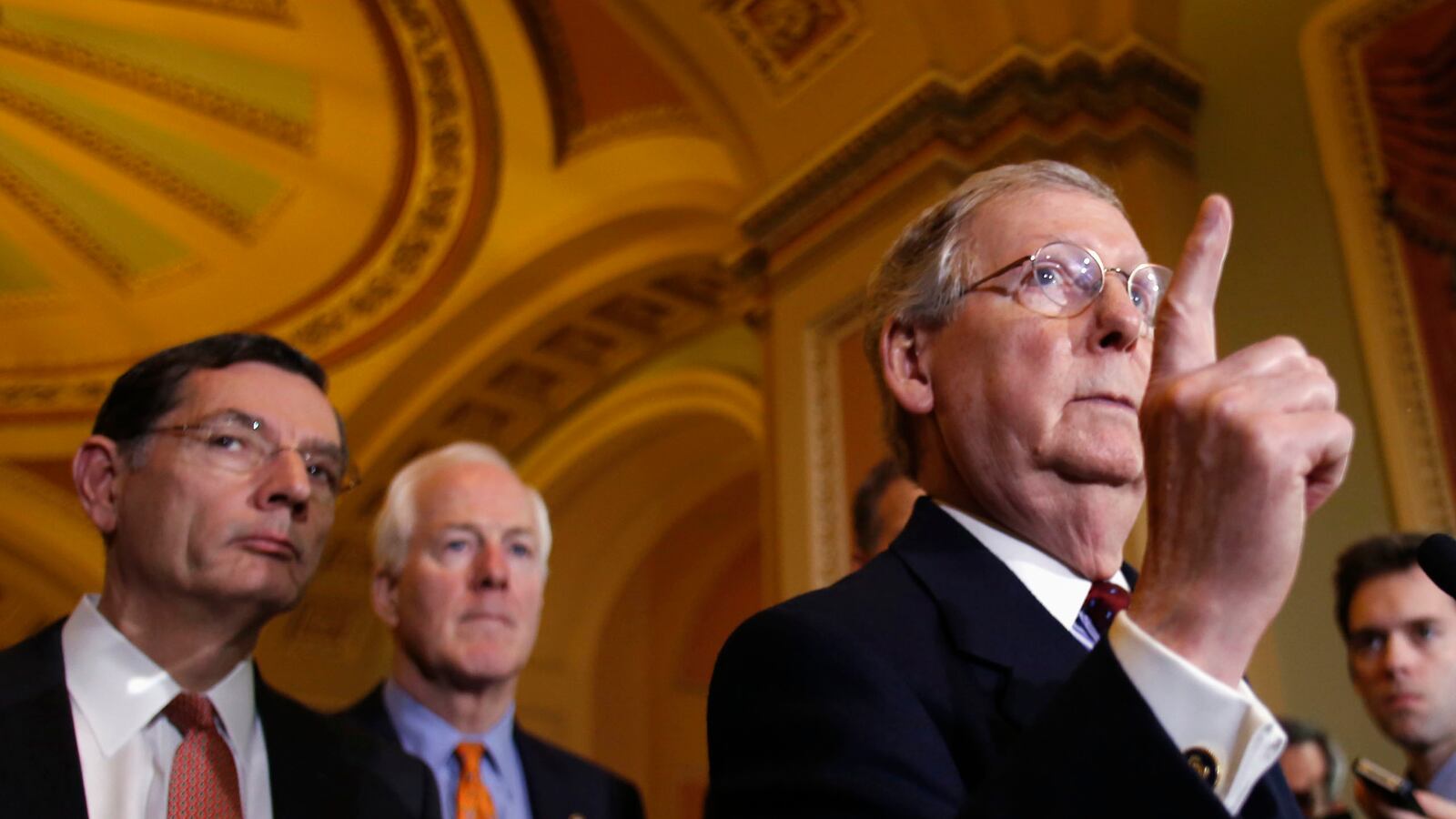The Obama White House wants to believe that the relatively easy passage of a bipartisan budget deal on Capitol Hill signals a new era of good feeling, opening the door to a compromise on immigration reform and other legislative breakthroughs like raising the minimum wage which have broad public support. Following last week’s strong bipartisan vote in the House, the Senate on Wednesday passed the budget 64 to 36, with 8 Republicans voting with all 55 members of the Democratic caucus.

It was a rare moment where Congress actually functioned, but there are ample warning signs that the sudden burst of cooperation from Republicans may be nothing more than a tactical pause in the partisan wars as they regroup.
“It’s too early to tell, Is this a new age or is this Republicans just getting out of the way of the Obamacare train roaring down the track,” says Republican pollster Ed Goeas. “If the train is roaring down the track, don’t get behind it and push harder.”
In other words, keep the focus on Obamacare and away from possible charges of overreach. From the GOP point of view, if the other party is in the process of destroying themselves, Republicans should stay out of the way and let the headlines and the Right wing noise machine do their job.
Then seemingly out of nowhere, Rep. Paul Ryan, budget negotiator and party savior, announced on one of the Sunday shows that Republicans can’t get “nothing” in exchange for raising the debt ceiling when the deadline is reached next year, likely in March. The charitable explanation for Ryan’s threat is that he’s soothing the base, which is angry at him for allowing some spending to rise, assuring Tea Party conservatives he’s up for the fight.
White House officials say they take Senate leader Mitch McConnell’s word and other Republican leaders that their party will not default. “But he (Ryan) opened the door to further sabotage of the country’s full faith and credit,” says Jim Manley, former top aide to Democratic leader Harry Reid. And Senate leader Mitch McConnell followed up, saying he “can’t imagine” Republicans would accept a “clean” debt ceiling without getting something in return. What Republicans will attempt to extort from the White House will be decided at their retreat in January.
Speaker Boehner has called for a dollar for dollar reduction in spending for any debt increase, and Republicans want approval of the Keystone pipeline, demands they will have a hard time setting aside. “A political consultant would say ‘just cool it’ on the debt ceiling, the last thing the American people want is a replay of what we just went through,” says William Galston, a senior fellow with the Brookings Institution. He cautions that conservatives may not back off. “The debt ceiling vote will be something close to an acid test that this budget deal represents a cease fire in the budget wars.” Galston served on President Clinton’s domestic policy staff, and while he applauds the compromise reached by Rep. Ryan and Sen. Murray, he says a small budget doesn’t carry the ideological weight of a significant increase in the debt ceiling that many Republicans oppose on principle.
“Do we see a glimmer of hope? Yes we do,” said White House press secretary Jay Carney, calling the bipartisan votes in the House and Senate “positive augurs for the future. But we’re not getting over-excited because we’re not naïve,” he added. For now, the White House is choosing to take McConnell at his word that his party will not default. “We don’t think that will happen, but let me be clear—the president’s position will be no different next year than it was this year,” said Carney, meaning no negotiating with Congress over paying the bills for the spending on defense and on domestic programs that Budget Chairman Paul Ryan just agreed to increase.
The compromise deal represents a coming of age among Republicans, a tentative willingness to declare independence from conservative outside groups pushing them to further and further to the right. “The government shutdown was a clarifying experience for members who hadn’t been around for a while, and don’t remember how the shutdown (of the 1990s) hurt the party,” says John Feehery, a former top House leadership aide. Members like and trust Ryan, and his leadership, together with Boehner’s open defiance of the outside groups has set up a battle for the hearts and minds of members, and raised questions about exactly who these groups are serving.
The Senate Conservatives Fund, established by former South Carolina Republican Jim DeMint, “get their political juice from Rush Limbaugh” says Feehery. The radio talk show host is a huge fan of the Fund, which relies on small donations from around the country. The Club for Growth is funded by billionaires, mainly hedge fund libertarian types. “They wouldn’t like this deal no matter what,” says Feehery. Neither group is likely to be cowed by Ryan or Boehner.
The Heritage Foundation and its political arm, Heritage Action, are the most vulnerable to a backlash from corporate backers. Heritage Action pushed for the government shutdown, but stayed out of the debt ceiling fight in deference to their funders. Corporate America doesn’t like the brinkmanship. The Chamber of Commerce is taking sides in Republican primaries, which they never did before, in an effort to elect more moderate candidates. How these groups fare over the coming months will be a key indicator as to whether a significant shift back to the center and a climate of compromise is possible. Historically, presidents get the first two years of a second term to legislate; Obama barely got one, and is eager to claim what he can of 2014.






